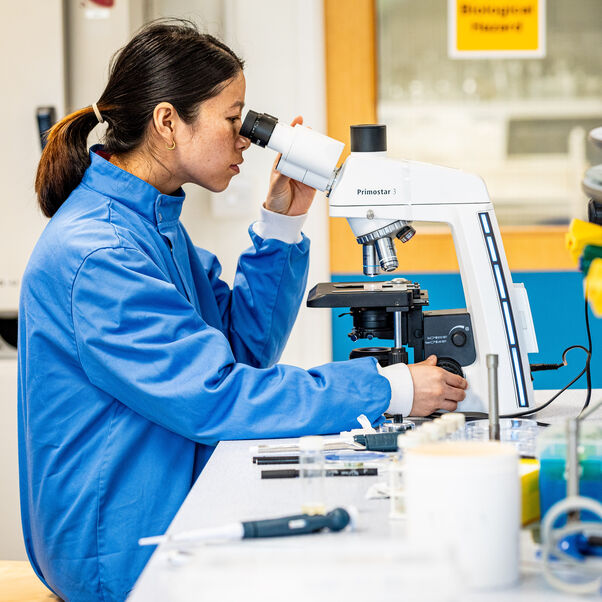Biomedicine in allied health diverse internships
Background
NHS England (NHSE) and Institute of Biomedical Science have identified the need to increase the number of Biomedical and Clinical Scientists supporting the workforce agenda. However, the Workforce Race Equality Standard (WRES) report in 2023 highlighted several barriers which impact recruitment, retention and experience of NHS staff.
While the NHS is recognised a very diverse organisation, recruitment practices don’t fully reflect this. There is a lack of trust among staff from minoritised background with respect to recruitment and progression in the NHS.
Enabling a diverse pipeline, including Biomedical and Clinical Scientists, is key to the NHSE workforce agenda. This is a challenge, especially where there’s limited capacity regarding placements and where these opportunities are unpaid.
Unpaid placements perpetuate inequalities, particularly affecting students from low socioeconomic backgrounds or minoritised groups. Funded by NHS England South West as part of the ICA Observatory funding, the scope of this project was to provide opportunities for widening participation students to undertake a paid placement year with NHS Trusts in the South West region.

Objectives
The project objectives included:
- Providing bursary funding opportunities to students from widening participation backgrounds to undertake year-long sandwich placements.
- Fostering collaboration between UWE Bristol’s School of Applied Sciences and NHS Trusts within Bristol, North Somerset and South Gloucestershire (BNSSG) Integrated Care System, to enhance student training in areas allied to health. For example, Biomedical and Biosciences training, supporting integration into healthcare settings.
- To increase the diversity of the workforce and career pipeline in the sciences, addressing the current lack of representation. By offering financial support and structured guidance, we help students from underrepresented backgrounds overcome barriers. For example, the awarding gap, and ensuring they have equitable opportunities to succeed in their careers.
About the project
Collaborating with NHS Trusts within the BNSSG Integrated Care System, the project provides skilled undergraduate Biological and Biomedical Sciences students with bursaries and support to undertake a placement year. These placements aim to facilitate knowledge sharing, skills development, and capacity building in health-related fields.
By providing bursaries to underrepresented and widening participation students, the project addresses barriers to accessing placement opportunities. This collaboration aims to enhance clinical and pathology services, empower student beneficiaries and foster integrated care, benefiting academia, healthcare institutions, and the wider community.
What this project covered
- Funding opportunities: Our project provides financial support to students from underrepresented backgrounds, ensuring financial barriers don’t hinder their educational and career aspirations.
- Mentorship and guidance: Access to a network of experienced mentors who offer personalised guidance and support throughout their placement journey through the UWE Bristol Equity Programme.
- Cohort identity: Building networks among placement students fosters cohort identity, promoting collaboration and support during placements.
Project goals
- Promoting equity: Ensuring all students, regardless of their background, have equal access to placement, educational opportunities and resources.
- Supporting diversity: Celebrating and supporting the diverse perspectives, experiences, and talents of our student community.
- Fostering innovation: Encouraging innovative thinking and research that addresses the unique challenges and needs of diverse populations.
- Promoting professional and personal development: Encouraging students to engage with and participate with negotiated non-mandatory training for continuous professional development.
Impact
This project has benefits for all stakeholders involved. Overall, this project fosters diversity, encourages innovation and supports professional development, contributing to a more equitable and effective NHS.
Benefits to the NHS Trusts
- Enabling a future diverse workforce
- Opportunity to deepen collaboration with UWE Bristol’s School of Applied Sciences
- Opportunity to increase the number of Health and Care Professions Council (HCPC) registered biomedical and clinical scientists following completion of the placement year
- Findings from the project to inform future placement development and training beneficial to the NHS Trusts.
Benefits to the School of Applied Sciences and UWE Bristol
- Increased number of placement opportunities for students which is central to UWE Bristol’s employability and enterprise agenda
- Bursaries for students from widening participation backgrounds support the equality, diversity and inclusion institutional agenda
- Outcomes from students who embark on the placement year contributes to positive outcomes in the annual Graduate Outcomes Survey (GOS).
Benefits to bursary recipients
- Skills development and training
- Opportunity to be HCPC registered improving their career prospects
- Direct financial support in the form of bursaries
- Practical knowledge and skills training and development in the NHS from experienced scientists
- Access to mentoring and support from both the NHS training providers and the School of Applied Sciences project team
- Opportunities to develop networks with future employers.
"Overall, this project has emphasised the need for inclusive practice in the development and management of internships and placements. It shows the need for and contributes to a more equitable and effective NHS workforce, enhancing integrated care with culturally competent healthcare professionals."
Prof. Emmanuel Adukwu Project Lead, UWE Bristol
Lessons learned
This project has highlighted that to diversify the NHS workforce, an intentional approach is required, supported by all partners including NHS Leadership. In addition, universities need to ensure that inclusive practice informs the design of all internships and placements. In particular, internships and placements that contribute to the health sector and the NHS to enable culturally competent patient care and health outcomes.
Next steps
- Identifying funding schemes to continue partnerships, enabling diverse participation with internships and sandwich placements.
- Forge stronger partnerships – strengthen ties between UWE Bristol, the NHS, and integrated care systems for enhanced collaboration.
- Ongoing evaluation – Continuously assess and refine the programme to optimise outcomes.
- Sharing good practice – Sharing main outcomes from the project with participating NHS Trusts and opportunities to develop and improve training and placement plans between stakeholders.



